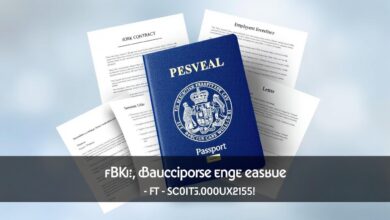From Application to Approval: How to Secure a Sponsored Job in Australia’s Key Sectors
Applying for a visa in Australia can be tough, especially if you need a sponsor.
Anúncios
This guide will help you understand the steps and what you need for a work visa. Knowing the application process well is key to getting your visa approved.
This guide covers the Australian immigration system in detail. It offers tips on preparing your documents and finding expert help. Every step is important to boost your chances of getting a visa in Australia.
Understanding Australia’s Sponsorship System
The sponsorship system in Australia is key for skilled workers from countries like Nigeria. It lets employers bring in foreign workers when local talent is scarce. Knowing about employer sponsorship in Australia and sponsorship visas can help applicants understand visa requirements.
You will be redirected to another website
What is Employer Sponsorship?
Employer sponsorship is when an Australian business hires a skilled worker from abroad. The employer must show that no local candidate can fill the role. This way, businesses can get global talent and solve skill shortages.
Types of Sponsorship Visas
There are many sponsorship visas for different skills and jobs. The most common ones are:
- Temporary Skill Shortage (TSS) Visa: This visa lets employers hire foreign workers for temporary jobs on Australia’s Skilled Occupation List.
- Employer Nomination Scheme (ENS) Visa: This visa allows employers to hire skilled workers for permanent jobs, promoting long-term work in Australia.
Eligibility Requirements
To qualify for sponsorship, candidates must meet certain requirements. These include:
| Criteria | Description |
|---|---|
| Skill Level | Applicants need the right skills and qualifications for the job. |
| Age | Applicants usually must be under 45 years old when applying. |
| English Proficiency | Applicants must show they can speak English well, often through tests like IELTS. |
Key Sectors Seeking Sponsored Jobs
Australia has many sponsored jobs, especially in growing industries. It’s key for job seekers to know these sectors. Health care, information technology, and engineering are leading the way, offering many job options.
Health Care and Nursing
The health care and nursing sector is booming in Australia. This is due to an aging population and more focus on health. It needs nurses, doctors, and specialists in mental health and aged care.
Those looking for sponsored jobs in Australia should consider this field. It offers stable jobs for skilled workers who want to help the community.
Information Technology
The information technology sector is crucial to Australia’s economy. It needs skilled people in software development, data analysis, and cybersecurity. This demand creates many sponsored job opportunities in Australia.
Those interested in IT will find lots of job openings. They should use their skills to find a spot in this growing market.
Engineering and Construction
The engineering and construction industries are vital for Australia’s infrastructure. They need engineers, project managers, and construction workers for ongoing projects. These sectors offer many job opportunities in Australia.
They attract international professionals looking for sponsored roles. Exploring these sectors can help find the best fit for your skills.
Application Process Overview
The visa application process in Australia can be overwhelming. Knowing each step well can make it easier. This guide covers the basics, including what documents you need and common mistakes to avoid. It aims to help you succeed in your application.
Step-by-Step Application Guide
Finding a sponsor is the first step. You need to show your skills and experience match the job. Then, you must gather important documents, such as:
- Proof of qualifications and experience
- Identification documents
- Employer sponsorship details
Once you have your documents, fill out the visa application forms carefully. Make sure all information is correct and complete. After submitting your application, keep an eye on its status.
Key Documentation Required
Applicants need to prepare several documents for their visa application. The table below lists the main documents you’ll need:
| Document | Description |
|---|---|
| Proof of Qualifications | Educational certificates and professional licenses relevant to the job |
| Identification Documents | Passport copies and other identification verifications |
| Employer Sponsorship Letter | A letter from the employer outlining the offer and sponsorship details |
| Health Assessments | Documentation proving medical fitness as per Australian standards |
Common Mistakes to Avoid
Knowing common mistakes can improve your chances of approval. Avoid errors like:
- Submitting incomplete application forms
- Failing to provide necessary documentation for visa application
- Not adhering to deadlines
Being aware of these mistakes can help you navigate the application process better. It increases your chances of getting a visa.
Skills Assessment Requirements
A skills assessment is key for visa applications in Australia. It checks if your qualifications and work experience match Australian standards. Knowing about this process can really help you find work in Australia.
What is a Skills Assessment?
A skills assessment checks if you meet Australian work standards. It looks at your education and work history. Passing this test is crucial for getting a visa, showing you have the right skills for your job.
How to Get Your Qualifications Recognized
Getting your qualifications recognized in Australia is important. You need to send your diplomas, transcripts, and work history to the right authority. Make sure your documents meet the authority’s needs for a smooth process.
Choosing the Right Assessing Authority
Picking the right assessing authority in Australia is important. Different authorities handle different jobs. Research the right one for your field. This can make the assessment easier and increase your chances of success.
Navigating the Job Market
Finding a job in Australia’s job market needs a smart plan, especially for those from abroad. Knowing who to look for, networking well, and using job sites can help. These steps can make your job hunt better and boost your chances of getting sponsorship.
Researching Potential Employers
It’s key to find companies that sponsor international workers. Look at industries with skill gaps, as they often need global talent. LinkedIn can show you companies that value diversity.
Learn about a company’s culture and values. This helps you tailor your application to fit their needs.
Networking and Job Search Strategies
Good networking is vital for job hunting in Australia. Go to events, conferences, and seminars to meet employers or industry pros. Use LinkedIn to connect with others in your field.
Join discussions or ask for advice from those with more experience. This can lead to job tips or referrals.
Utilizing Job Portals
Job sites in Australia are a big help for job seekers. Sites like SEEK and Indeed list jobs that mention sponsorship. This makes it easy to apply.
Check these sites often and set up alerts for jobs you want. Keep your profile up to date and highlight your skills to catch employers’ eyes.
| Job Portal | Key Features | Suitable for Sponsorship Roles |
|---|---|---|
| SEEK | Offers filters for sponsorship jobs and direct company links. | Yes |
| Indeed | Aggregates job listings and allows setting alerts for specific criteria. | Yes |
| Professional networking and job listings; connects users with recruiters. | Yes | |
| Glassdoor | Company reviews and salary insights; job listings with sponsorship. | Sometimes |
Building a Strong Resume and Cover Letter
Making a strong resume and cover letter is key in Australia’s job market. This part talks about what makes a good resume, a great cover letter, and how to tailor applications for Australia.
Essential Elements of a Resume
A good resume needs certain parts to grab an employer’s attention. Key sections include:
- Contact Information
- Professional Summary
- Work Experience
- Education
- Skills
- References
Each section should show relevant work and skills. It’s also good to include numbers to show your achievements.
Crafting an Impactful Cover Letter
A cover letter is like a story that shows why you’re right for the job. Good tips for Australia say to include:
- A personalized greeting
- An engaging opening statement
- A clear explanation of why you’re a good fit
- A brief conclusion to encourage more talk
This way, you can show your unique strengths and understand what the employer wants.
Tailoring Applications for Australian Employers
It’s important to make each application fit the Australian job market. By learning about the company’s culture and using the right words, you can stand out. Show how your experience matches what’s needed in Australia.
| Resume Element | Description |
|---|---|
| Contact Information | Full name, phone number, email address, LinkedIn profile |
| Professional Summary | A brief overview of skills and experiences |
| Work Experience | Details of past jobs, responsibilities, and achievements |
| Education | Degrees, certifications, and relevant training |
| Skills | Relevant technical and soft skills related to the job |
| References | Contact details of professional references |
Preparing for Interviews
Getting ready for interviews in Australia is key to landing a job. Knowing common interview questions can boost your confidence. It’s also important to understand the workplace culture in Australia. Employers want people who fit their company’s culture, not just have the right skills.
Common Interview Questions
Interviewers ask many questions to check your skills and fit. Be ready to answer questions like:
- Tell me about yourself.
- What are your greatest strengths and weaknesses?
- Why do you want to work here?
- Describe a challenging situation you faced and how you handled it.
- Where do you see yourself in five years?
Understanding Australian Workplace Culture
Australian workplaces value teamwork, clear communication, and being on time. Knowing these values helps you connect with interviewers. Be professional and show you value teamwork and open communication.
Tips for a Successful Interview
Here are some tips to do well in an interview:
- Practice answers to common questions to feel more confident.
- Learn about the company, its values, and recent successes.
- Wear professional clothes to show you’re serious about the job.
- Arrive early to make a good first impression.
- Send a thank-you email after the interview to show your appreciation.
Understanding Visa Fees and Processing Times
When you apply for a work visa in Australia, knowing the visa fees is key. These fees change based on the visa type and extra needs. Planning your budget for visa application costs helps avoid surprises, making the process easier.
Breakdown of Visa Application Fees
Visa application costs include different fees. Here’s a table showing common visa types and their fees:
| Visa Type | Visa Fees (AUD) | Additional Costs |
|---|---|---|
| Temporary Skill Shortage Visa (482) | 3,000 | Medical examinations, skills assessment fees |
| Employer Nomination Scheme (186) | 4,000 | Skills assessment, English language tests |
| Skilled Independent Visa (189) | 4,250 | Skills assessment, medical exams |
Processing Time for Different Visa Types
Processing times in Australia differ by visa type and application details. Knowing these times helps plan your move better. Here’s a quick look at estimated processing times:
- Temporary Skill Shortage Visa (482): 2 to 4 months
- Employer Nomination Scheme (186): 5 to 12 months
- Skilled Independent Visa (189): 6 to 12 months
Planning Your Budget
Planning your budget for visa application costs is more than just the fees. You should also think about health insurance, travel, and living costs while waiting. This way, you’re fully prepared and less stressed during the application process.
Final Steps After Visa Approval
Getting your visa approved is just the start of your new life in Australia. You’ll need to take a few practical steps to settle in well. These steps help you get ready for your new home and life.
What to Do Upon Arrival in Australia
Finding a place to live is your first task. Many people start with temporary housing to get to know the area. Next, opening a bank account is key for managing money and finding a job. Don’t forget to get health insurance for medical care during your first months.
Setting Up Your New Life
Getting used to a new country means learning about its laws and customs. Knowing about schools, transport, and work rules helps a lot. Also, finding out about local services and amenities makes life easier.
Plan your days to include exploring, settling in, and meeting new people. This helps you adjust quickly to your new surroundings.
Connecting with Local Communities
Making friends is crucial for a happy life in Australia. Join clubs, cultural groups, or local events to meet people. Online forums and social media are great for finding others in similar situations.
Being part of the community makes you feel more at home. It also makes settling in easier in this lively and diverse country.
FAQ
What are the essential visa requirements for Australia?
To get a visa for Australia, you need a valid passport. You must also meet health and character standards. Getting a job offer from an approved employer is key. You’ll need to show you have the right skills and qualifications for the job.
How long does the visa application process take?
The time it takes to get a visa in Australia varies. It can be a few months or over a year. The complexity of your application and the Department of Home Affairs’ processing times affect this.
What tips can improve my chances of visa approval in Australia?
To boost your visa approval chances, make sure your documents are complete and correct. Meet all eligibility criteria and provide solid proof of your qualifications. Getting expert visa advice can also help you through the process.
What types of sponsorship visas are available in Australia?
Australia has several sponsorship visas. These include Temporary Skill Shortage (TSS) visas, Employer Nomination Scheme (ENS) visas, and Regional Sponsored Migration Scheme (RSMS) visas. Each visa has its own rules and benefits for different situations.
How can I find potential employers who sponsor workers?
Look for companies that sponsor workers on job portals and at networking events. Use LinkedIn to connect with employers looking for international talent.
Is a skills assessment required for all visa applicants?
Not all visa applicants need a skills assessment. But most skilled visas do. It’s important to check if your visa type requires it.
What are common mistakes to avoid during the visa application process?
Avoid incomplete applications and missing documents. Don’t lie on your application and meet deadlines. Double-check your application and include all necessary documents.
How important is a cover letter in the Australian job application process?
A cover letter is very important. It lets you show your interest in the job and highlight your relevant skills. It also explains why you’re a good fit for the company.
What taxes and costs should I consider when moving to Australia?
Moving to Australia means thinking about visa fees, taxes, healthcare, and living costs. Plan your budget carefully to ensure a smooth transition.
What should I do after my visa is approved?
After your visa is approved, find a place to live and get health insurance. Open a bank account and learn about local laws and customs. Joining local communities can help you settle in.
Published on: 12 de April de 2025

Arturo González
Arturo González is the founder and lead writer of DebxCred.com, a platform created to help people make smarter and more informed financial decisions. With a degree in Business Administration and a specialization in Financial Marketing, Arturo built a solid corporate background before deciding to share his knowledge in a practical, easy-to-understand way.
Driven by a genuine passion for finance and education, Arturo turned DebxCred.com into a trusted source for detailed reviews of financial products, digital banking tools, and practical financial education — empowering readers to take control of their money with confidence.
In his free time, Arturo finds balance and inspiration while surfing — a hobby that reflects his calm yet determined approach to helping others build a healthier and more prosperous financial life.






